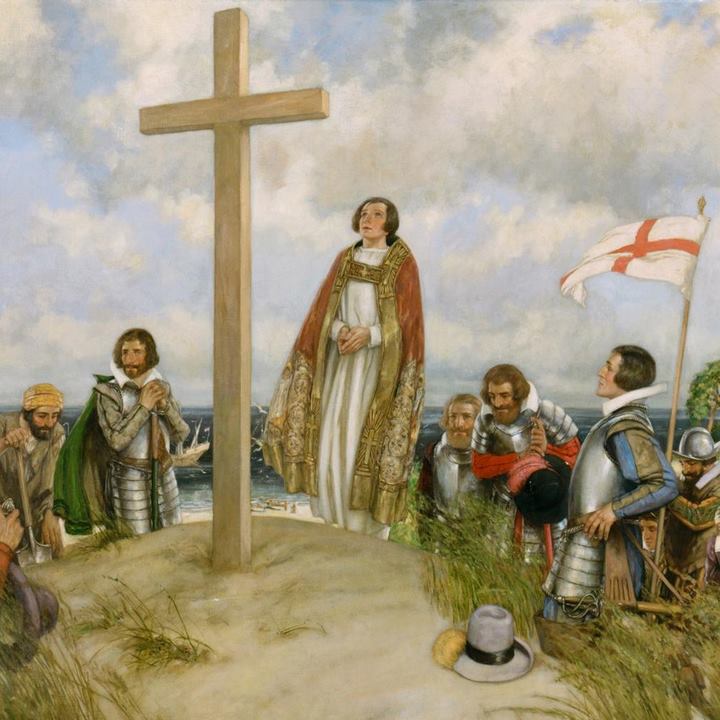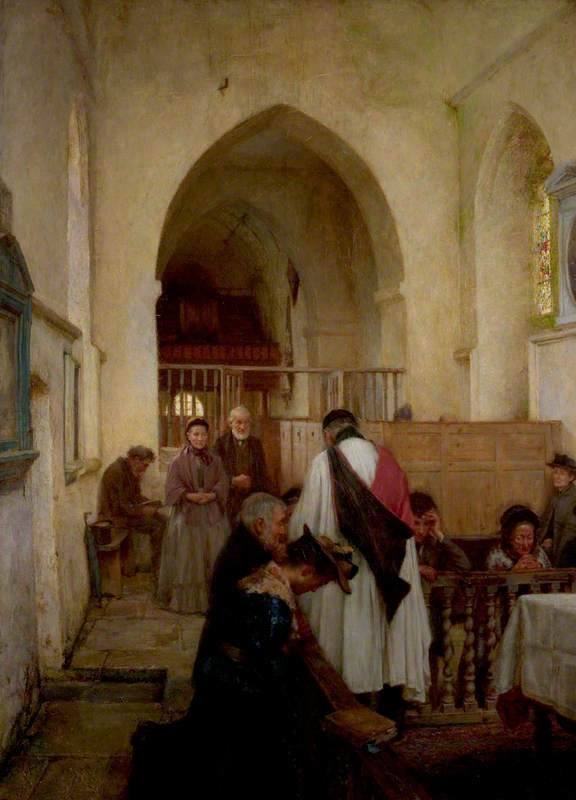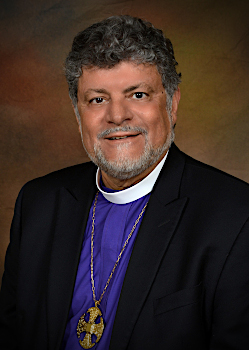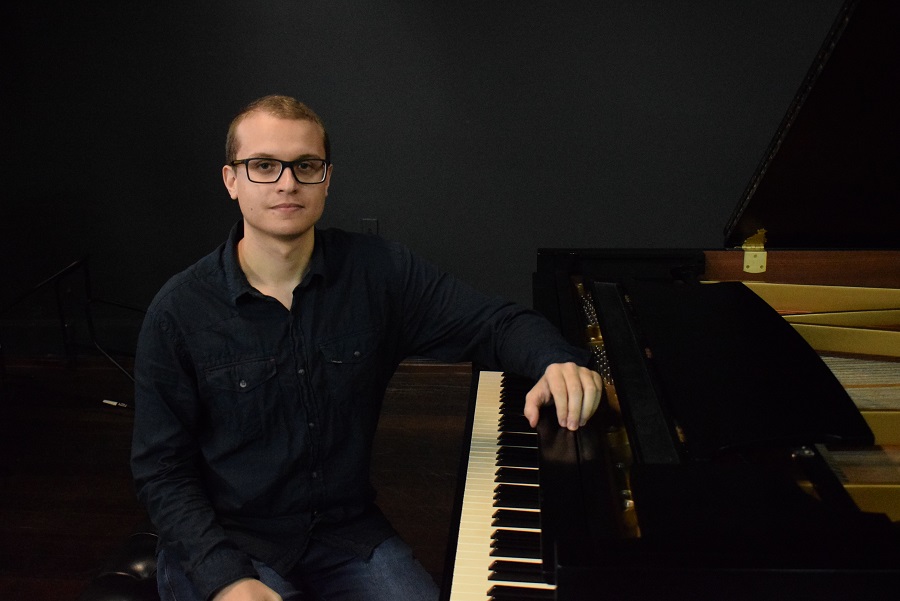Almighty God, give us grace that we may cast away the works of darkness, and put upon us the armor of light…

Anglicans worshipping God at the founding of the Jamestown colony (1607)
…For Holy Scripture doth set out unto us only the Name of Jesus Christ, whereby men must be saved.

What is the Anglican Way?
Just as St. Paul and the early Christian evangelists traveled to Corinth and Philippi and Thessalonica, men and women of faith brought Christianity to the British Isles in the A.D. 50s. These saints were the beginning of the “Anglican” (Latin for English) Church. We are the first English speaking Christians, and so our heritage developed within and around Roman Catholic, Eastern Orthodox, and European Protestant Christianity.
The earliest American Anglicans came to our shores with the first generation of settlers, and our ranks include founding fathers like George Washington and Patrick Henry. After the Revolutionary War, American Anglicans began to be known as “The Protestant Episcopal Church” but, when in the late 20th century leaders of that institution gradually abandoned the faith they had sworn to protect, faithful Americans once again took up the old name “Anglican” to reconnect to the vibrant tradition in which so many saints have lived and died in victory.
At various times over the last 2,000 years, we have been allied closely with Roman, Eastern, and European Protestant churches, but our unshaking allegiance is to:
1. The Trinity: the Father, the Son, and the Holy Ghost
2. The Holy Scriptures (which ‘contains all things necessary to salvation’)
3. The creeds and councils of the undivided church
4. The teaching of the ancient Christian bishops and doctors.
5. The Formularies of the Anglican Way: the Book of Common Prayer, the Articles of Religion, and the Book of Homilies.
We are Catholic because our bishops are by doctrine and consecration linked to the 12 chosen by our Lord Jesus Christ; we are Reformed because our tradition bears the fruit of the Protestant Reformation’s focus on Scripture and Grace.
As one of our bishops has said, we are: ‘Protestant and Reformed according to the principles of the ancient Catholic Church,’ The Rt. Rev. John Cosin (1672).
For Additional Reading on the Reformed Episcopal Church:
THE RESOLUTION ON CHRISTIAN SEXUAL ETHICS
OUR BELIEFS
DO NOT DELETE - PLACEHOLDER FOR FIRST COLLAPSE
DO NOT DELETE ME!
What is the Trinity?
There is but one living and true God, everlasting, without body, parts, or passions; of infinite power, wisdom, and goodness; the Maker, and Preserver of all things both visible and invisible. And in the unity of this Godhead there be three Persons, of one substance, power, and eternity; the Father, the Son, and the Holy Ghost.
Who is Jesus Christ?
The Son, which is the Word of the Father, begotten from everlasting of the Father, the very and eternal God, and of one substance with the Father, took Man’s nature in the womb of the blessed Virgin, of her substance: so that two whole and perfect Natures, that is to say, the Godhead and Manhood, were joined together in one Person, never to be divided, whereof is one Christ, very God, and very Man; who truly suffered, was crucified, dead, and buried, to reconcile his Father to us, and to be a sacrifice, not only for original guilt, but also for actual sins of men.
Who is the Holy Ghost?
The Holy Ghost, proceeding from the Father and the Son, is of one substance, majesty, and glory, with the Father and the Son, very and eternal God.
Of the Sufficiency of Scripture for Salvation
Holy Scripture containeth all things necessary to salvation: so that whatsoever is not read therein, nor may be proved thereby, is not to be required of any man, that it should be believed as an article of the Faith, or be thought requisite or necessary to salvation. In the name of the Holy Scripture we do understand those canonical Books of the Old and New Testament, of whose authority was never any doubt in the Church.
What is Baptism?
Baptism is not only a sign of profession, and mark of difference, whereby Christian men are discerned from others that be not christened, but it is also a sign of Regeneration or New-Birth, whereby, as by an instrument, they that receive Baptism rightly are grafted into the Church; the promises of the forgiveness of sin, and of our adoption to be the sons of God by the Holy Ghost, are visibly signed and sealed; Faith is confirmed, and Grace increased by virtue of prayer unto God.
The Baptism of young Children is in any wise to be retained in the Church, as most agreeable with the institution of Christ.
What is Holy Communion?
The Supper of the Lord is not only a sign of the love that Christians ought to have among themselves one to another; but rather it is a Sacrament of our Redemption by Christ’s death: insomuch that to such as rightly, worthily, and with faith, receive the same, the Bread which we break is a partaking of the Body of Christ; and likewise the Cup of Blessing is a partaking of the Blood of Christ.
Transubstantiation (or the change of the substance of Bread and Wine) in the Supper of the Lord, cannot be proved by Holy Writ; but is repugnant to the plain words of Scripture, overthroweth the nature of a Sacrament, and hath given occasion to many superstitions.
The Body of Christ is given, taken, and eaten, in the Supper, only after an heavenly and spiritual manner. And the mean whereby the Body of Christ is received and eaten in the Supper, is Faith.
The Sacrament of the Lord’s Supper was not by Christ’s ordinance reserved, carried about, lifted up, or worshipped.
What is the Book of Common Prayer?
The Book of Common Prayer contains forms for all the different kinds of worship in the Church. It includes a form for daily Morning and Evening Prayer, a plan for reading through the Bible in the course of a year and the Book of Psalms each month, a form for the Lord’s Supper or Holy Communion, for Baptism, for Confirmation, a form of instruction in the basics of the Christian faith, a form of prayer while visiting the sick, for weddings, for funerals. In other words, it provides the structure, content, and instructions for all the essential occasions of prayer and worship in the shared life of the Church. These forms of worship have definitively shaped, for more than 400 years, the way in which Anglicans experience, think about, and live out the Christian faith.
Here is a link to the line by line Bible references in the Book of Common Prayer: https://cwtc.gitlab.io/scriptural-bcp/index.html
What’s the point of the Book of Common Prayer?
“Cranmer’s book, and its direct successors, will always be acknowledged as historical documents of the first order, and masterpieces of English prose, but that is not what they want or mean to be. Their goal — now as in 1549 — is to be living words in the mouths of those who have a living faith.”—Alan Jacobs, The Book of Common Prayer: A Biography (2013), 193-194.
How does the Book of Common Prayer achieve that aim?
“The Prayer Book as a system of spiritual discipline is invaluable in helping us to grow to maturity in Christ. It continually reminds us that the good of the Kingdom of Heaven lies not in the devices and desires of our own hearts but in living in and by the Word of God.”—Anthony Burton, “Some Observations on the Daily Offices” (unpublished lecture).
What if I don’t feel like saying the words?
“I knew inescapably some things which my lighter will might not have chosen to know. I knew what penitence was (even if impenitent); the liturgy told me and made me enact it. I knew what joy was, and a refreshed turning to God (even if not joyful, not returning); the language forced me to know. . . . It came to me and changed me, this tough compelling language, which demands that its meanings be practiced even in the uttering of the words.”—Margaret A. Doody, “‘How Shall We Sing the Lord’s Song upon an Alien Soil?’: The New Episcopalian Liturgy,” in Leonard Michaels and Christopher Ricks, editors, The State of the Language (1980), 122-123.
But why am I saying someone else’s words instead of my own?
“People complain about praying someone else’s words rather than their own in the liturgy, but that is the precise point of liturgy. By ‘borrowing’ the language of the Church which has been handed over to us (in tradition) we hand ourselves over to God and to each other . . . . The psalms and the Lord’s Prayer are words that God has given to us. They are words that we ‘borrow’. As we ‘borrow’ these words we are participating in the inspired speech of the Holy Spirit, which will serve to reform all of our language. . . . The language that comes spontaneously to the modern worshipper is not the language of Christian worship but the language of the silly pop ditties that he grew up with. In the name of spontaneity the modern worshipper tends to unwittingly borrow the romantic language of the world. The purpose of chanting psalms and singing hymns is not merely to glorify our language, but to heal it. The language of worship that is given to us by Scriptures and the Christian tradition informed by the Scriptures is one that is quite unnatural to us. It is God’s purpose that, as we use this language, it will become increasingly natural to us. The words, although they are borrowed, are no longer entirely alien to us, for they have converted us to themselves.”—Alastair Roberts, “Garrison Keillor on Liturgy,”Alastair’s Adversaria (June 6, 2006).
Why repetition?
“The vulgarians conceive of scripture as a ‘read’ in the course of which ideas and information are picked up. They do not care about a text which can be appropriated and endlessly repeated, till it provides the furniture of the mind and etches itself on the soul. They do not realise how rich and solid memory deteriorates into bits and pieces—mere fragments, isolated incidents. Yet religion depends on what is known by heart, in the heart.”—David Martin, “Why Spit on Our Luck?,” Poetry Nation Review, vol. 6, no. 5 (1979), 2.
But doesn’t this constrain my freedom?
“In romantic thought, repetition is the enemy of freedom, the greatest form of repression both in the mind and in the state. Outside romanticism, repetition has a very different import: it is the sustaining and renewing power of nature, the basis for all art and understanding. The detailed history of repetition deserves a book to itself; here it will suffice to note that repetition lost its moral value only with the spread of the industrial machine and the swelling of the romantic chorus of praise for personal originality. Until two hundred years ago virtually no one associated repetition with boredom or constraint.”—Edward Mendelson, Early Auden (2000), 172.
Are there other reasons to write down the words of the service?
“One of the advantages of having a written and printed service, is that it enables you to see when people’s feelings and thoughts have changed. When people begin to find the words of our service difficult to join in, that is of course a sign that we do not feel about those things exactly as our ancestors. Many people have, as their immediate reaction to that situation the simple remedy — ‘Well, change the words’ — which would be very sensible if you knew that we are right and our ancestors were wrong. It is always at least worth while to find out who it is that is wrong.” — C. S. Lewis, “‘Miserable Offenders’: An Interpretation of Prayer Book Language,” reprinted in God in the Dock (1970), 120.
Is the Book of Common Prayer just for ministers?
“Out of the elaborate, complicated Canonical Hours of the medieval Breviary the sixteenth-century Reformers produced a pattern of daily praise and prayer that was loyal to tradition, solidly Scriptural in content, simple and convenient in execution, balanced and artful in design. The older Latin Offices had been a primary duty of the clergy, the monks and friars, upon whom their recitation was imposed by canonical law. But the Reformers intended their simpler, vernacular forms to be a means of corporate worship and edification in the knowledge of God’s Word for all the laity no less than the clergy. In this purpose their labors have borne abundant fruit.” — Prayer Book Studies VI: Morning and Evening Prayer (1957), 3.
Why use traditional language?
Beginning with its earliest editions in the sixteenth century, the Book of Common Prayer has had a definite character or linguistic register. Over the next four centuries, nearly all Anglican liturgies retained this character or register (sometimes called “prayer book English”), even as there was modest linguistic updating—for example, “Our Father, which art in heaven” became “Our Father, who art in heaven.” In the second half of the twentieth century, some Anglican liturgies were written that experimented with contemporary language. This experimentation continues, and today there is wide linguistic variety, with some Anglican churches using traditional language and some using contemporary. The most important thing is to love and serve God—not the kind of language that is used. However, there are positive benefits to retaining the traditional language of the Book of Common Prayer.
One is the repetitions and rhythms of Cranmer’s work. Those repetitions and rhythms are not merely ornamental—they are part of how the Book of Common Prayer “works,” as ways of securing attention, increasing comprehension, encouraging memorization, and thus of influencing behavior. Modern liturgies sometimes seek to avoid repetition and often lack these prose rhythms; they suffer for it.
There is also an important advantage to stability in a liturgy. It allows the development of a rich system of interlocking texts. Indeed, this is exactly what has happened in English with the echoes and allusions between the Book of Common Prayer and the King James Version and the hymns of the eighteenth, nineteenth, and twentieth centuries. With the traditional language of the Book of Common Prayer, a congregation is able to more fully participate in this tradition of Christians past, present, and future.
None of this is meant to suggest that the language of worship has to be traditional. Instead, the point is simply that there are good reasons, grounded in the present, for retaining this feature of Anglican worship.
Is the language too difficult?
“Despite the quality of language that strikes us nowadays as majestic, grandly alienated, perhaps what is most notable about the words of the Prayer Book are their simplicity and directness. C. S. Lewis called this ‘pithiness’; I would add ‘coziness’ or ‘comfortability.’” – James Wood, “God Talk: The Book of Common Prayer at Three Hundred and Fifty,” New Yorker (Oct. 22, 2012).
“Cranmer is as simple as: ‘O God our help in ages past’. People talk loosely of ‘beautiful Shakespearian English’ when in fact Cranmer is not at all like Shakespeare and very much more simple.” – David Martin, “Why Spit on Our Luck?,” Poetry Nation Review, vol. 6, no. 5 (1979), 3.
OUR PASTOR

THE REV. RICHARD TARSITANO
Vicar
A life-long Anglican, Richard Tarsitano was born in Denver, Colorado, but moved around quite a bit including stops in Connecticut, South Carolina, Missouri, Louisiana, and Georgia. He joined the Navy straight out of high school and spent nine years roaming the high seas aboard ships homeported at Naval Station Mayport. He achieved the rank of chief petty officer before choosing to separate from the Navy in 2013 to pursue a calling to the priesthood.
Father Tarsitano has a Master of Divinity degree from Gordon-Conwell Theological Seminary. His undergraduate work included a BA in English with a minor in Professional Education.
Fr. Tarsitano is the husband of the long-suffering Meghan Tarsitano who graciously puts up with his “book mountains” and incorrigible love of the Chicago Cubs. The family also includes Madeline Rose Tarsitano, and her brother, Hugh Laurence Tarsitano.
OUR BISHOP

The Rt. Rev. Peter F. Manto
Bishop Ordinary
Bishop Manto oversees the Reformed Episcopal Church’s Diocese of the Central States. He has been a parish pastor for over 40 years beginning his calling as the church-planter for the non-denominational church which became Trinity Church (Mason, OH). Finding truth and beauty in the Anglican Way, he guided its move into the Reformed Episcopal Church as the best way to live as Christian men and women until our Lord returns. Bp. Manto has been married to his wife Janice for over 40 years. They have been blessed with four adult children and 15 grandchildren.
Our Organist

Dr. Pedro Medeiros
Organist
Dr. Pedro Medeiros is our very talented organist. He holds a Masters degree in piano performance from the University of South Dakota and a doctorate in piano performance from Ball State University.
